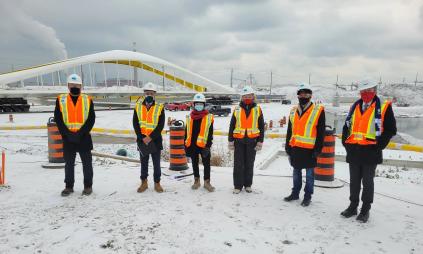Accountability
We are committed to openness, transparency and accountability and these values are at the core of our promise to the people of Toronto, Ontario and Canada.
As a tri-government organization, we are fully accountable to the governments and people of Canada, Ontario and the City of Toronto. Our priorities are set jointly with our government partners and numerous checks and balances are in place to oversee our work.

Approvals and Oversight
Each government approves all its funding to Waterfront Toronto through detailed and binding contribution agreements. Funding for each project and in many cases phases of projects is administered through contribution agreements, as is corporate annual spending. Contribution agreements are based on an annual tri-government negotiated long-term funding plan, which is approved by Toronto City Council, the Ontario Minister of Infrastructure and the Federal Minister of Finance.
Audits
Since 2002, Waterfront Toronto has been the subject of at least 89 audits. We have used their findings to steadily strengthen and enhance our fiscal responsibility and accountability practices. Our audited financial statements are available on our website for the public to review.
A Program Review conducted by the Government of Canada in 2014 found that revitalization projects have been successfully implemented and completed to deliver significant economic benefits. The City of Toronto completed a Strategic Review of our work in 2015. That report concluded: “[Waterfront Toronto] has generally delivered revitalization projects effectively, with due regard for economy and efficiency, and consistent with international best practice.”
Read the City Manager’s full report.
Planning Approvals
Waterfront revitalization projects must go through several levels of approval. For instance, all land sales must be approved by the government that owns the land. The precinct plans that define and guide the design and construction of new neighbourhoods go through extensive public consultation and are approved by Toronto City Council. To date, three precinct plans for new waterfront neighbourhoods have received this approval: East Bayfront, West Don Lands and Keating Channel. All environmental assessments follow a strict process of public consultation and approvals, including, in the case of all Provincial Class Environmental Assessments, formal review and approval by the Ontario Ministry of the Environment and Climate Change.
Public Consultation and Engagement
As a planning and development organization, much of our work is regulated under the municipal planning process. As a matter of course we carry out extensive public consultations and comply with municipal statutory requirements.
Since 2006, we have held over 491 public and stakeholder meetings and more than 23,500 people have participated in our work through public and stakeholder consultation events.
Accountability through our Board of Directors
The three orders of government each appoint four representatives to our Board of Directors, and jointly select a Chair. The Board helps ensure that our revitalization mandate is delivered in an accountable, transparent manner.
The Toronto Waterfront Revitalization Corporation Act, 2002 sets out the authorities and accountabilities of the corporation. By-Law No. 1, being the general by-law of the Corporation which governs Board activities.
Board and Committee meetings are open to the public, consistent with the requirements for public meetings under the Toronto Waterfront Revitalization Corporation Act, 2002. Such open Board meetings are in keeping with one of Waterfront Toronto’s key objectives: to engage the community in the revitalization of our waterfront.
View the Open Board Meeting By-Law Policies on Public Access to Information
In order to provide an independent review of Waterfront Toronto’s Board and Board Committee’s open meeting performance, Waterfront Toronto has appointed an Investigator to conduct investigations if there is a complaint about a closed meeting.
Learn more about Closed meeting investigations.
There are three sub-committees of the Board – The Finance, Audit and Risk Management Committee; the Human Resources, Governance and Stakeholder Relations Committee; and the Investment and Real Estate Committee.
Policies
You can view our policies and guidelines on issues such as Codes of Conduct; Hospitality, Travel & Meals; Gifts; Disclosures; Procurement; Public Board Meetings; Design Review Panel By-Laws; Freedom of Information; and many others.
Visit our Document Library to view a complete list of our policies.




